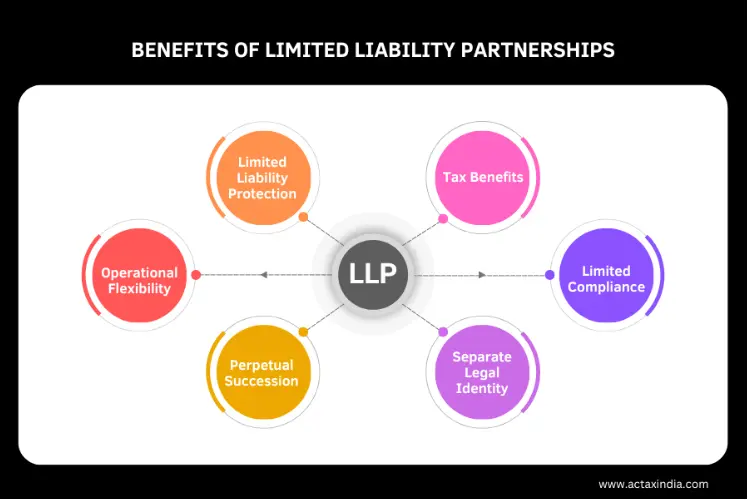Picking the right company structure for your startup becomes a determining point in the long run whether your business will succeed or not. Factors like personal liability protection, tax benefits, capital raising capacity, credibility, branding, and succession planning, hugely depend on the choice of your company structure. Hence, it becomes important for you to choose wisely.
Typically speaking, an LLP or a Private Limited structure works the best for a startup. For startups offering consultancy services or professional services, an LLP is a more favorable option, because of its tax benefits (e.g., limited liability) and flexibility (e.g., easy ownership transferability). For a product-based startup, the private limited structure is probably the best choice. This is because of its fundraising potential (e.g., capacity to attract probable investors), limited liability protection, and professional image. However, the point of analysis does not stop there and you need to have more clarity of thought before making the right decision. This blog covers everything you need to know about a Limited Liability Partnership or a Private Limited Company, that would help you to make the right decision for your startup.
LLP vs Private Limited Company: All That You Need To Know
Limited Liability Partnership vs Private Limited Company: The Basic Concept
What is a Limited Liability Partnership (LLP)?

According to Section 3(1) of the Limited Liability Partnership Act, 2008, a Limited Liability Partnership (LLP) is a corporate body that has been formed and incorporated under the above-mentioned Act. It is further considered as a legal entity that is treated separately from that of its partners. In simple terms, it is a partnership, wherein the partners enjoy the benefits of limited liability protection (i.e., partners will not be held responsible/liable for the losses/mistakes of another partner, and each of them is only responsible for their actions). An LLP follows the rule of perpetual succession. A minimum of 2 partners are required to incorporate an LLP, further authenticated by an agreement of partnership.
What is a Private Limited Company (Pvt. Ltd.)?

According to Section 2(68) of the Companies Act, 2013, a Private Limited Company (Pvt. Ltd.) is a company structure wherein its Articles of Association restrict the amount of its minimum paid-up ) share capital , and also the right to “transfer its shares”. In simple terms, it is a privately held company that limits the number of its shareholders and does not permit public trading of its shares. At least two members (i.e., Directors) are required to set up a private company. However, the number (i.e., of shareholders) cannot exceed 200 (unlike an LLP, which can have limitless members). Apart from that, the Directors also enjoy the benefits of limited liability protection (especially during company closure and loss).
Limited Liability Partnership vs Private Limited Company: Registration & Formation Process
The process of LLP and Private Company registration is almost the same, with a few basic differences. Both have no authorized capital requirements. Both require their partners/directors to obtain a DSC (Digital Signature Certificate) and DIN (Director Identification Number)/DPIN (Designated Partners Identification Number) and choose a suitable company name that has never been used before by some other corporate entity. The rest of the processes are mentioned in the section below
How to form and register a Limited Liability Partnership?
After obtaining the DSC and DPIN, and subsequently selecting the company name as per the MCA guidelines, fill out the FiLLiP Form (which can be availed from the MCA website), which collects data regarding the proposed LLP partners, LLP agreement, and proofs associated with the registered office. Also, fill out the declaration part of the form, which comprises the declaration of the consenting partners regarding the fact they would be complying with all LLP regulations. Next, draft an LLP agreement, outlining the basis of the partnership, which must be filed to the MCA with notarization within 30 days of company incorporation. After the verification of all the aforesaid documents, the ROC will be providing your company with a COI (Certificate of Incorporation). This signifies the official existence of the company. After that, apply for company PAN and TAN.
How to form and register a Private Limited Company?
After getting the DSC and DIN, opt for company name reservation through Part A of the online SPICe+ Form. Herein, you will be asked to indicate your company structure, choose company type, industry, and so on. You will be allowed to propose two names under this form, one of which will be approved by MCA. By leveraging Part B of the SPICe+ Form, fill in other details like registered office proof, stamp duty, Director’s details, and so on. Attach all the necessary documents along with it (e.g., DSC and DIN of the Directors, DSC of an authorized professional of company formation, etc.). Herein, you can directly opt for the company PAN and TAN application as well. Lastly, draft the e-MOA and e-AOA and submit it along with the SPICe+ Form. Upon successful verification, your company will be provided with a COI, PAN, and TAN.
Limited Liability Partnership vs Private Limited Company: Pros & Cons
How can your startup benefit from the structure of a Limited Liability Partnership?

A startup can benefit from the structure of an LLP in the following ways:
Limited Liability Protection:
By registering your startup as an LLP, you can enjoy limited liability protection, which protects your personal assets in case the company fails in the market. This provides an ample amount of mental peace and enables you to focus on business development freely without any fear.
Tax Benefits:
In LLPs, the partners tend to enjoy the benefit of no DDT (Dividend Distribution Tax). LLPs enable the associated partners to receive their additional profit shares, by eliminating the DDT burden, which is an extra tax burden, usually incurred by the traditional companies.
Limited Compliance:
LLPs possess a simplified version of regulatory compliance, if compared to the other company structures. For example, the annual filing regulations are less burdensome. This lessens the administrative loads of the startups.
Operational Flexibility:
Based on collective understanding, the partners of an LLP distribute their roles and responsibilities (often listed under the LLP agreement). This makes the process of internal management extremely flexible, as it does not follow any hierarchy.
Perpetual Succession:
The status of an LLP does not get hampered by the departure or demise of a partner. This manifests stability and continuity for the business, which in turn, is a mandatory requirement for a startup to succeed (i.e., to remain uninterrupted).
Separate Legal Identity:
A startup can gain a separate legal identity if it gets registered as an LLP. Herein, all the partners are further treated as separate legal identities. This separation is highly important for personal protection as well as legal clarity and contractual relationships.
How can your startup benefit from the structure of a Private Limited Company?

A startup can benefit from the structure of a Private Company in the following ways:
Ease in Fundraising:
For startups, seamless fundraising is essential, and a private limited company has the potential to raise money (i.e., capital) through loans, deposits, and equity. It can obtain funding via banks, financial institutions, Directors, their family members, and so on.
Protection Against Creditors:
Startups, backed by their risky and experimental nature, are prone to business risks and losses. By registering your business as a private limited company, you can enjoy protection against creditors, in case of any financial loss (i.e., the creditors cannot directly sue the Directors).
Limited Liability Protection:
Just like an LLP, a private limited company also possesses the benefit of limited liability protection. In case of business failure, the Directors remain financially protected by the virtue of this right.
Tax Advantages:
According to Section 80IAC of the Income Tax Act, of 1961, these company structures are eligible for 100% tax exemption. Herein, the other tax advantages include low corporate tax rates and split income. Such advantages are beneficial for startups with minimal funds.
Perpetual Succession:
Similar to an LLP, a private limited company also enjoys the benefits of perpetual succession. In the absence of one of the Directors, the other Director can feasibly look after the business operations.
Flexible Management:
The limited size of a private limited company manifests the feasibility of management. Moreover, a private limited company provides its owners with the complete authority to run the company, which they further delegate to the Board of Directors, keeping things flexible.
What are the disadvantages of a Limited Liability Partnership?
The main disadvantages of an LLP are:
Difficulty in Fundraising:
Venture capitalists, angel investors, and private equity funds refrain from investing their capital/money in an LLP. This is because such investment would amount to them becoming partners with the LLP.
Heavy Penalty on Non-Compliance:
Irrespective of the fact that LLPs have minimal regulatory requirements, non-compliance with those regulations results in heavy penalties. For example, in case of omitted Form 11 or Form 8 Annual Filing, a penalty of ₹100 comes into force, on a per-day basis.
Allows Limited Professions:
There exists a list of “approved professions” for LLPs. Anyone outside that professional circumference cannot opt for an LLP registration. These professions mainly include law, accounting, consultancy, and architecture.
Mismanagement and Oppression:
The Limited Liability Partnership Act, 2008 does not contain any provision or clause on mismanagement and oppression. This often leads to workplace harassment and poor work-life balance for the workers.
What are the disadvantages of a Private Limited Company?
The main disadvantages of a Private Company are:
Administrative Burden:
In a private company, regular tax filings, financial reports, and minutes of meetings are required to be maintained judiciously, increasing the administrative burden of the management extensively; which often becomes difficult for a startup due to its limited resources.
Complicated Accounts:
Backed by its complex web of regulatory compliance, as a startup begins to grow and expand, its accounting requirements also become intricate and complex. This problem can only be solved by hiring an accountant or by opting for accounting services. Contact Actax India to know more about such services. We offer them!
Shared Ownership:
As discussed previously, a private company functions based on shared ownership. This can lead to slower decisions, more arguments, compromised autonomy, less freedom, and limited transferability of shares.
Restricted Share Transfer:
The structure of a private limited company restricts the shareholders from leaving it. This is mainly because of the restrictions on the transfer of shares. Moreover, a private limited company is not listed on any stock exchange, making transferability even more difficult.
Other Key Differences You Need To Know: Limited Liability Partnership vs Private Limited Company
To choose the right structure for your startup, you need to have clarity about a few more key differences.
Points of Distinction | Limited Liability Partnership | Private Limited Company |
Partners/Directors Required | Maximum – No Limit Minimum – 2 Partners | Maximum – 15 Directors Minimum – 2 Directors |
Board Meetings | Not necessary. | Four board meetings each year. The gap between the two meetings should not be more than 120 days. |
Statutory Audit | Mandatory only under two conditions:
| Mandatory |
Liability | Up to agreed contribution | Up to capital contribution |
Ownership Status | The partners are the owners and the managers. | The shareholders or the owners do not have direct managerial powers. |
Foreign Direct Investment (FDI) | Allowed through the approval route only (approval must come from either RBI or FIPB). | Allowed through the automatic route as well as the approval route. |
Taxation | Must pay a fixed rate of 30% over its total income. When the income exceeds ₹1 crore, then the IT amount gets increased by 12% more. | Must pay a fixed rate of 25% over its total income. When the income exceeds ₹400 crores, the payable tax amount becomes 30% over its total income. |
Annual General Meeting | Not required | Once a year |
Share Transferability | Can be transferred by passing a resolution, which must be in agreement with the existing partners. | The context is limited by the contents of the Articles of Association. |
Case Studies: Limited Liability Partnership vs Private Limited Company

Herein, two case studies have been leveraged to show the real-life contexts of the above-mentioned discussions; specifically regarding the selection and usages of the LLP structure and the Private Limited structure, for you to have more clarity.
The Case of Handoo and Handoo: The First LLP of India
Handoo and Handoo were legal consultants, who established their company structure as an LLP in 2009 (i.e., the first time in India, since the Limited Liability Partnership Act, of 2008 came into force). Herein, two concrete assumptions can be made as a rationale behind such a choice:
- The partners of an LLP enjoy the benefits of limited liability protection, that shields them from financial debts. This can prove to be a huge point of advantage for legal consultants like Handoo and Handoo, as law firms are prone to facing financial obligations/associated lawsuits due to the nature of their work.
- As mentioned earlier, LLPs manifest flexible internal management. By leveraging this, legal firms like Handoo and Handoo can design a profit-sharing structure that would be satisfactory for the associates (as every associate involved there would be professionals, demanding their share of profits, gained from their expertise/service; lawyers, CAs, consultants, and any service-providers are deemed as professionals).
The Success Story of Byju’s: A Modern Day Private Company
Byju’s is now a “multinational educational technology company” in India, but it was initially started as a small business entity, back in 2011, when the edtech industry was not even relevant in the contemporary business landscape. In other words, the company launched a brand new idea/product (i.e., its educational App), with minimal resources. Here are a few assumptions regarding why byju’s chose a private structure while setting up its business in the former days:
- Being an unconventional startup, Byju’s opted for a Private Limited structure to drive seamless fundraising, if compared to that of a Public Company. This was more because they had minimal financial resources to begin with, and they needed to attract more investors.
- New ideas are often risky, and a public company structure mandatorily demands short-term profit facilitations, because of its nature of public trading of shares. As a result, Byju’s chose the easier option and went for a Private structure to freely invest in product development, and omitted the pressure of immediate profit generation.
The Bottom Line
As a startup owner, you can choose between either of these two (i.e., Limited Liability Partnership vs Private Limited Company), depending on the nature of your business and strategic goals. However, it can be deduced from the above observations that a service-based startup would work better within an LLP setup. Similarly, a product-based startup would function better with a Private Limited setup. Choose wisely to see your business soar with growth and profit.
Actax India provides registration services for both of these company structures. So, if you’re struggling to get your startup registered, contact Actax India. Even more so, if you’re struggling to choose what structure to choose for your organization, book a consultancy with our experts to clear all your doubts, and make informed decisions.






